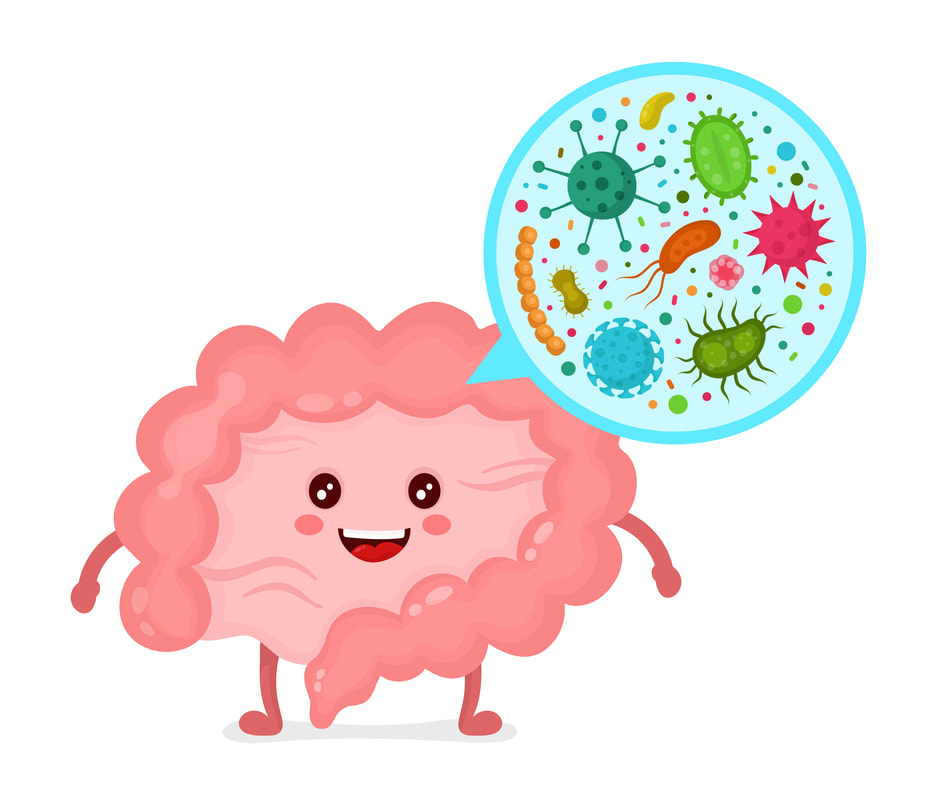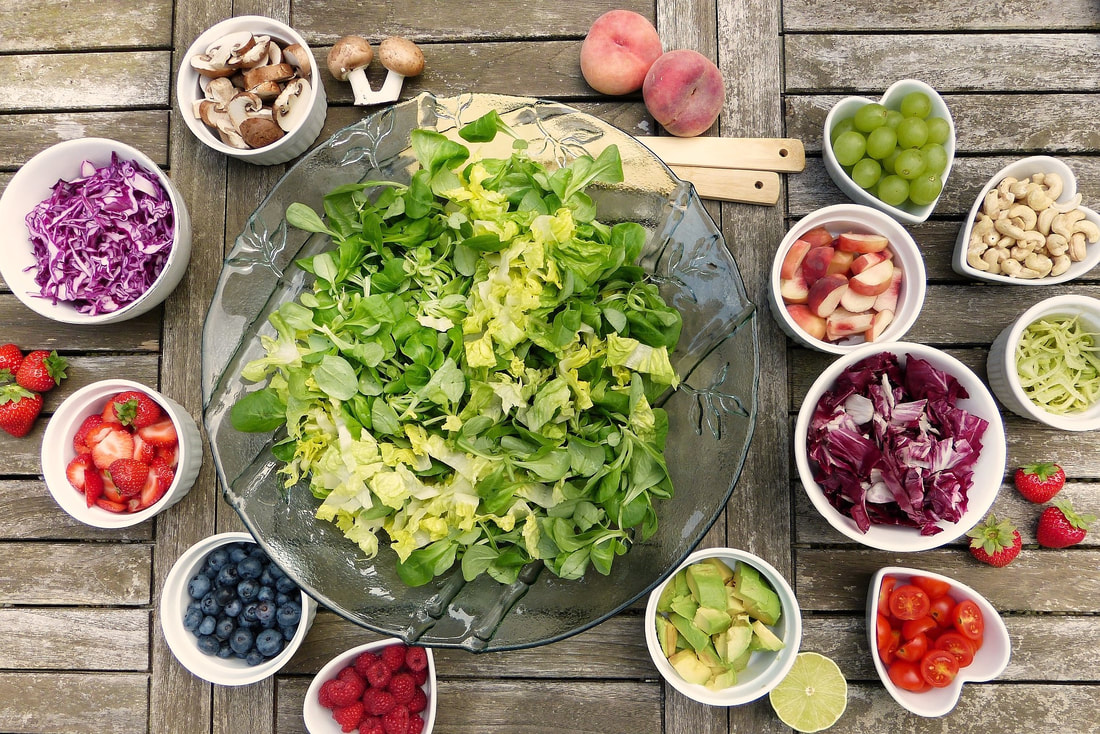How Do I Know If I Have A Leaky Gut?
Leaky gut is a popular topic in the health and wellness spheres these days. It's been blamed for many symptoms and conditions that seem to be all-too-common. Allergies, intolerances, joint pain, even autoimmune diseases can all be linked back to leaky gut.
But what exactly is leaky gut? What causes it? What kinds of issues are related to it? And most of all, what can you eat for leaky gut?
By the time you're finished reading this week's blog post, you will feel a literally bit better informed about leaky gut.
But what exactly is leaky gut? What causes it? What kinds of issues are related to it? And most of all, what can you eat for leaky gut?
By the time you're finished reading this week's blog post, you will feel a literally bit better informed about leaky gut.
What Is A Leaky Gut?
Simply put, our gut, or intestinal tract, is a tube that makes up part of our digestive system. It’s not as simple as a hose or pipe, it’s an amazing tube made of live cells tightly bound together. Our gut helps our bodies absorb fluids and nutrients, digests our food, and houses billions of friendly gut microbes.
It's also selective to what it allows past its barrier. Our intestinal tract purposefully keeps some things from being absorbed, so they pass right on through to the other end to be eliminated as waste. You don't want to absorb many harmful microbes or toxins into your body, right?
FUN FACT: About 70-80% of our immune system is housed around our gut, so it’s ready for foreign invaders.
Absorption of fluids and nutrients happens when they're allowed through this cellular tube into the circulation. And this is great, as long as what's being absorbed is fluids and nutrients. The blood and lymph then carry the nutrients to our livers, and then around to the rest of our bodies. This is so that all our cells, all the way to our toenails, get the nutrition they need to be healthy and grow.
It's also selective to what it allows past its barrier. Our intestinal tract purposefully keeps some things from being absorbed, so they pass right on through to the other end to be eliminated as waste. You don't want to absorb many harmful microbes or toxins into your body, right?
FUN FACT: About 70-80% of our immune system is housed around our gut, so it’s ready for foreign invaders.
Absorption of fluids and nutrients happens when they're allowed through this cellular tube into the circulation. And this is great, as long as what's being absorbed is fluids and nutrients. The blood and lymph then carry the nutrients to our livers, and then around to the rest of our bodies. This is so that all our cells, all the way to our toenails, get the nutrition they need to be healthy and grow.
How Does A Gut Become "Leaky?"
The gut can become leaky if the cells get damaged, or if the bonds that hold the cells together get damaged. Leaky gut can be caused or worsened by a number of diet and lifestyle factors. Dietary factors like too much sugar or alcohol or even eating things that we're intolerant to can all contribute to leaky gut.
Lifestyle factors like stress, lack of sleep, infections, and some medications can also be culprits in this area. Sometimes, if the balance of gut microbes inside the gut is thrown off, this can also contribute to a leaky gut.
Any contributing factors that alter the balance in our guts may cause them to become permeable or leaky. At this point incompletely digested nutrients, microbes (infectious or friendly), toxins, or waste products can more easily get into our bodies.
Scientifically speaking, a leaky gut is known as intestinal permeability. This means that our intestines are permeable and allow things through that they normally would keep out. They leak.
As you can imagine, this is not a good thing.
Lifestyle factors like stress, lack of sleep, infections, and some medications can also be culprits in this area. Sometimes, if the balance of gut microbes inside the gut is thrown off, this can also contribute to a leaky gut.
Any contributing factors that alter the balance in our guts may cause them to become permeable or leaky. At this point incompletely digested nutrients, microbes (infectious or friendly), toxins, or waste products can more easily get into our bodies.
Scientifically speaking, a leaky gut is known as intestinal permeability. This means that our intestines are permeable and allow things through that they normally would keep out. They leak.
As you can imagine, this is not a good thing.
Leaky Gut Symptoms
Because so much of our immune system is around our gut, the immune cells quickly recognize a foreign invader and start their response. This is normal and good if the gut is working properly and not allowing too many things to in.
When that happens too much, and the immune system starts responding, the notorious inflammation starts. Once the immune system starts responding it can look like allergies, food intolerances, and even autoimmune diseases.
Because the first place affected is the gut, there are a number of symptoms right there. Things such as abdominal pain, bloating, gas, nausea, vomiting, heartburn, constipation or diarrhea. Not to mention that if foods, even healthy foods, aren't properly digested, their nutrients aren't properly absorbed. Poor absorption can lead to a lack of essential vitamins and minerals for the optimal health of every cell in our bodies.
Some symptoms can also occur on the skin. Acne, dry skin, itchiness, rashes, eczema, and hives can all be symptoms related to leaky gut. Even rosacea and psoriasis can be linked due to their autoimmune component.
It’s even possible that some neurological symptoms are linked with leaky gut. For example, brain fog, fatigue, headaches, inability to sleep, and general moodiness.
Finally, a number of chronic inflammatory diseases are thought to be linked with a leaky gut. Things like Crohn's, colitis, celiac disease, IBS, and MS. Even things like heart disease and stroke are possibilities.
When that happens too much, and the immune system starts responding, the notorious inflammation starts. Once the immune system starts responding it can look like allergies, food intolerances, and even autoimmune diseases.
Because the first place affected is the gut, there are a number of symptoms right there. Things such as abdominal pain, bloating, gas, nausea, vomiting, heartburn, constipation or diarrhea. Not to mention that if foods, even healthy foods, aren't properly digested, their nutrients aren't properly absorbed. Poor absorption can lead to a lack of essential vitamins and minerals for the optimal health of every cell in our bodies.
Some symptoms can also occur on the skin. Acne, dry skin, itchiness, rashes, eczema, and hives can all be symptoms related to leaky gut. Even rosacea and psoriasis can be linked due to their autoimmune component.
It’s even possible that some neurological symptoms are linked with leaky gut. For example, brain fog, fatigue, headaches, inability to sleep, and general moodiness.
Finally, a number of chronic inflammatory diseases are thought to be linked with a leaky gut. Things like Crohn's, colitis, celiac disease, IBS, and MS. Even things like heart disease and stroke are possibilities.
What To Eat For Leaky Gut
The general recommendation is to stop eating inflammatory foods and eat more gut-soothing foods.
Incorporating a gut-soothing diet means cutting out grains, legumes, and dairy. Add to that list, food additives, alcohol, and refined sugars.
In their place, add in more leafy greens and cruciferous veggies. These are full of nutrients and contain fibre to help feed our friendly gut microbes. We also want to add more sources of vitamin D, which can come from fish and egg yolks, and also from the sun. Eat more probiotic foods like sauerkraut, dairy-free yogurt, and kombucha. We need to make sure we're getting enough essential omega-3 fats found in seafood and seaweed, as well as coconut oil and bone broth. Coconut oil has special fats called MCTs, or medium-chain triglycerides, and bone broth has essential amino acids.
Incorporating a gut-soothing diet means cutting out grains, legumes, and dairy. Add to that list, food additives, alcohol, and refined sugars.
In their place, add in more leafy greens and cruciferous veggies. These are full of nutrients and contain fibre to help feed our friendly gut microbes. We also want to add more sources of vitamin D, which can come from fish and egg yolks, and also from the sun. Eat more probiotic foods like sauerkraut, dairy-free yogurt, and kombucha. We need to make sure we're getting enough essential omega-3 fats found in seafood and seaweed, as well as coconut oil and bone broth. Coconut oil has special fats called MCTs, or medium-chain triglycerides, and bone broth has essential amino acids.
Conclusion
Leaky gut, or intestinal permeability, can happen when our guts get damaged due to too much sugar and alcohol, or eating foods we're intolerant to. It can also be from stress, lack of sleep, or imbalance in our friendly gut microbes. The symptoms of leaky gut are vast, spanning from digestive woes to skin conditions, and even to autoimmune conditions.
It's important to cut out problem foods and drinks and add in more gut-soothing options like leafy greens, cruciferous vegetables, and probiotic foods. It's also important to ensure that we're getting enough omega-3 fats, vitamin D, and amino acids.
It's important to cut out problem foods and drinks and add in more gut-soothing options like leafy greens, cruciferous vegetables, and probiotic foods. It's also important to ensure that we're getting enough omega-3 fats, vitamin D, and amino acids.
Recipe: Slow-Cooked Chicken Broth
Recipe (Gut Soothing): Slow-Cooked Chicken Broth
Serves 6-8
Ingredients:
Instructions
Pro Tip: You can strain it before serving, or serve it with the cooked vegetables as soup.
Serves 6-8
Ingredients:
- 1 whole chicken, cooked, bones with or without meat
- 3 carrots, chopped
- 2 celery, chopped
- 4 bay leaves
- 4 tbsp apple cider vinegar
- Herbs and spices as desired (salt, pepper, paprika, parsley)
- 2 handfuls spinach
Instructions
- Place chicken bones, and meat if using, into a slow cooker.
- Add chopped vegetables, vinegar, and herbs/spices.
- Cover with hot water (about 2 litres/8 cups).
- Cook 8 h on medium or overnight on low.
- Add spinach 30 minutes before serving.
- Serve & enjoy!
Pro Tip: You can strain it before serving, or serve it with the cooked vegetables as soup.
Want More Information?
| Want to talk more about how to avoid a leaky gut with lifestyle and diet changes? Want to talk about your overall health in general? I'd love for you to book a free health coaching call. I want to find out what you are struggling with and give you my best tips to start you on a journey toward a lean and healthy body for life. Click on the button below to book your free call now. |
References:
https://www.thepaleomom.com/what-is-leaky-gut-and-how-can-it-cause/?cn-reloaded=1
https://www.thepaleomom.com/what-should-you-eat-to-heal-leaky-gut/
https://www.precisionnutrition.com/all-about-nutrition-gut-health
https://www.healthline.com/nutrition/is-leaky-gut-real#section3
https://www.thepaleomom.com/what-is-leaky-gut-and-how-can-it-cause/?cn-reloaded=1
https://www.thepaleomom.com/what-should-you-eat-to-heal-leaky-gut/
https://www.precisionnutrition.com/all-about-nutrition-gut-health
https://www.healthline.com/nutrition/is-leaky-gut-real#section3







